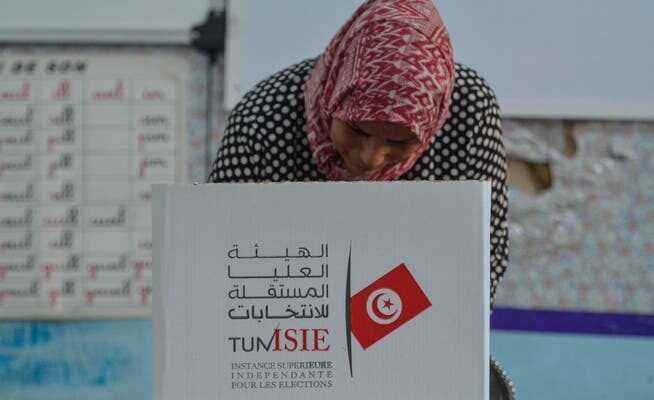In the homeland of the Arab Spring, a large majority has voted in favor of introducing a presidential system reminiscent of dictatorship. However, the low turnout undermines the legitimacy of the reform.
A Tunisian voting on Monday. The vast majority of voters stayed away from the polls.
Everyone sees the referendum as a success, albeit in different ways: While supporters of Tunisian President Kais Saied celebrate the fact that almost 95 percent of voters voted in favor of the new constitution, critics see the low turnout as a sign that their call for a boycott has worked have. Because only around 30 percent of the more than nine million eligible voters voted at all on Monday. That’s a million fewer than in the presidential election in autumn 2019, when Kais Saied was elected to office with 73 percent of the vote.
A man in his late forties, who rushed into a polling station in a middle-class district of the capital Tunis five minutes before closing time, said he decided at the last second to put a ballot in the ballot box after all. He voted for the new constitution. “I hesitated for a long time and I don’t know if it was the right decision, but it really can’t get much worse.” He hopes for new political impetus, a new dynamic in Tunisia’s political development.
An initial survey by a Tunisian polling institute confirms that most supporters are not primarily concerned with the text itself. A quarter each saw their vote as a vote for President Saied or for an improvement in the country’s social and economic situation. Only 13 percent said they voted primarily because they were convinced of the content of the new constitution.
The separation of powers only exists on paper
The text grants the President extensive powers. Critics speak of an authoritarian, hyper-presidential system in which the separation of powers only exists on paper. The new system does not provide for a control of the president or even an impeachment procedure by the parliament. The equal list suffrage, which guaranteed a high proportion of women in all elected bodies, is history.
There are also restrictions for Tunisians with dual nationality who want to hold political offices. Anyone who cannot prove that at least their own grandfather was a Tunisian citizen cannot become president. Islam also plays a greater role than it did in the 2014 constitution – even though it was created with the participation of the conservative Islamic Nahda party.
Even before the result was announced, Saied was celebrating his victory. While bathing in the crowd in Tunis on Monday evening, the former law professor promised his supporters that the constitutional reform would make Tunisia “a real democracy, not just a formal one like in recent years”. The 64-year-old, who has long been accused of authoritarian tendencies by critics, has threatened to pay the price for anyone who has “committed crimes against the people”.
The threat is aimed at his political opponents, above all the Nahda party, which Saied hates. It was the only political force involved in all governments since the revolution and many Tunisians hold it responsible for the rampant corruption and nepotism.
The opposition is questioning the legitimacy of the constitution
In practical terms, the adoption of the new constitution initially changes little in everyday political life in Tunisia, because de facto President Saied has been making many decisions on his own since he seized power on July 25, 2021 and shut down parliament. Since then he has ruled by decree. However, he can now refer to the legitimacy of his project at the polls.
A legitimacy that the Tunisian opposition is questioning, as well as the entire political process of the past year. Ahmed Najib Chebbi from the Rescue Front, an alliance of several parties and civil society groups, spoke of a double defeat for Saied. “Three quarters of the population did not follow his call,” says Chebbi.
He also suspects that the turnout figures have been embellished. “They do not tally with the polling station emptiness seen across the country.” So there can be no question of great support for the new constitution, says the 77-year-old politician, who was a member of the constitutional assembly from 2011 to 2014. After the 2011 revolution, they drafted a new constitution that was in force until Saied came to power.
Saied faces difficult decisions
The rescue front called on Saied to step down on Tuesday. In an inclusive dialogue, all democratic actors should then develop a reform plan, appoint an interim government and organize new elections. After the opposition failed to form a united front against the president last year, Chebbi hopes that the moment has now come to put aside the political conflicts of the past. “Kais Saied has never been so isolated as it is today, and he has never faced so many opposition forces.”
The President, meanwhile, has a number of urgent tasks ahead of him. The first thing he announced was that he would change the electoral law. Parliamentary elections are scheduled to take place on December 17 – exactly twelve years to the day after the self-immolation of greengrocer Mohamed Bouazizi, which triggered the wave of protests in Tunisia in 2010.
Above all, however, Saied must show a way out of the deep economic and financial crisis, which has worsened again in recent months. Although Tunisia has the prospect of a loan from the International Monetary Fund, this is linked to strict political conditions. If Saied accepts the loan, it would mean the end of wage increases and subsidies. This would run the risk of further exacerbating the social crisis.
